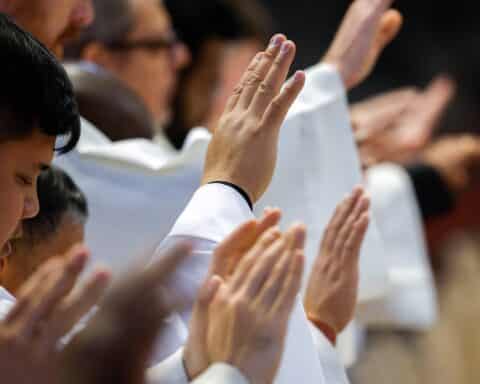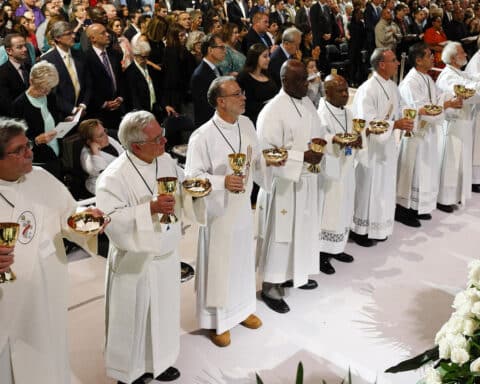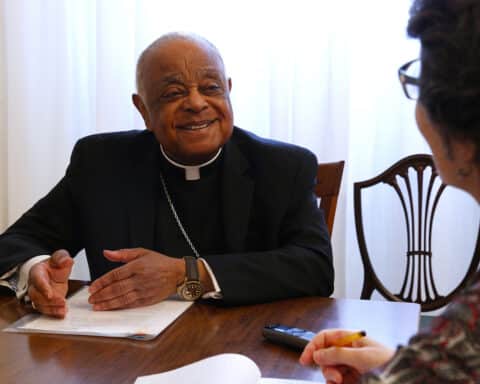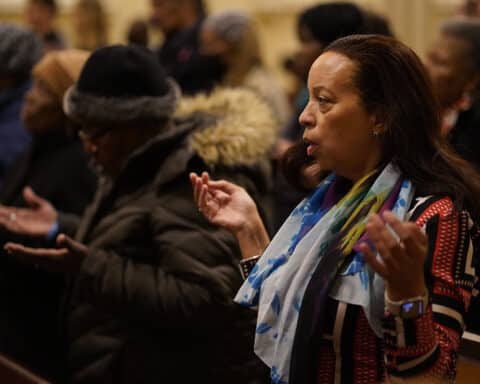I think it’s as godlike as his miracles.
Preaching from a boat along the shore, Jesus’ first word to the crowd is “Listen” (Mk 4:3, NRSV). For me, that’s as awesome as his calming the storms, his walking on water. That beginning to preach, he simply said, “Listen.” I meditate on that one little moment in Mark’s Gospel a lot. It’s just one of those moments — at least for me — that makes me believe in Jesus, in everything — that he’s the Messiah, that he’s God.
Because, you see, that’s how God talks. He tells us first to listen. “Hear, O Israel,” God said to his people (Dt 6:4). The word of God going forth from his mouth does not return empty; it achieves its purpose, Isaiah said (cf. Is 55:11). “Amen, amen,” Jesus said, “whoever hears my word and believes in the one who sent me has eternal life” (Jn 5:24). It’s God who summons us to listen; it’s God who said of his Son, in transfigured glory, “listen to him” (Mt 17:5). Again, that’s the simple, astounding thing I’m trying to underline: that Jesus calls us to listen because he’s God.
It belongs to the heart of the Christian experience of God — this truth, this listening. To come to God, to seek him, one becomes first a “catechumen” — that is, one becomes literally a hearer in whose ears resound the message of Jesus. Whoever knows God “listens to us,” John wrote (1 Jn 4:6). To belong to God is to listen; to belong to the Church is to listen. That’s the distinction and the choice one must make: to listen either to the world or to God (cf. 1 Jn 4:5). And such is the primeval spiritual challenge set before all ages, before each of us: whether we’ll listen to God within the Church, the mystery and Body of Christ — or not.
So this is how we should begin — with this primeval spiritual understanding of listening — if we’re ever to become truly a listening Church, if ever our global experiment in synodality is to mean anything. All the listening sessions, the small groups, the surveys: underneath it all are not merely anemic populist or democratic ideals — that is, synodality is not first about power — but rather this ancient yet contemporary invitation to listen to Christ, to be called by him to follow. It’s this spiritual moment of listening we must first understand, but what I’m afraid sometimes — conditioned by the world’s noise — we overlook. But how do we recover this better way of listening? How do we begin?
It’s a question of where. The answer is: get to where you can hear. The thing about listening, especially listening to God, is that it’s often an intimate thing. God whispering in Eden, whispering to Moses, to Elijah; Jesus gently whispering to Mary Magdalene that first Easter morning: God speaks to us within earshot, close to the heart. That’s true among believers, too. At least, we must make it true again. True listening presumes closeness, presumes community. Jesus indeed fed the multitudes and preached to them, too, but first he drew close to the Twelve. And that’s because spiritual listening begins small, within intimacy and friendship. Because that’s how real listening begins.
Which is my simple point. If you want to help the Church become truly a listening Church, then, as I said, get to where you can hear. Find a community, stay there, get to know people, serve, listen, speak. Enter the community that is also the mystery of Christ, the sacrament in which you may hear God. Hopefully, that’s your nearest parish church. At least, that’s where you should begin, where you should first try. Because before listening is a technique or a method, before it’s a movement of the people, it must be this: community. Listening must be an experience of community, a community that listens to God, a community of sisters and brothers that know full well that listening to God means listening to the people we’ve made a genuine effort to know. Even those we don’t want to hear, and that, because we accept — however hesitantly — that God may even be speaking through them, too. Because we have the courage to keep listening.
Father Joshua J. Whitfield is pastor of St. Rita Catholic Community in Dallas and author of “The Crisis of Bad Preaching” (Ave Maria Press, $17.95) and other books.





